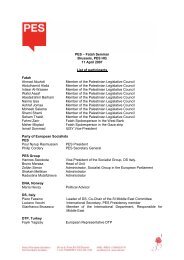Hedge funds and Private Equity - PES
Hedge funds and Private Equity - PES
Hedge funds and Private Equity - PES
You also want an ePaper? Increase the reach of your titles
YUMPU automatically turns print PDFs into web optimized ePapers that Google loves.
32<br />
The first era of capitalism took the form of family-owned capitalism where large family not only<br />
owned companies but also had the <strong>funds</strong> to make the necessary investments into their business.<br />
This traditional form was characterised by very close relationships between the management<br />
<strong>and</strong> the employees despite a cruel lack of social rights. Although in retrospect it appeared to<br />
some analysts as the “good times”, this period also revealed a lack of dynamism, where the<br />
economy was closed <strong>and</strong> very local, with few perspectives for expansion. Since the financial<br />
markets were not well developed, the access to finance was limited. Growth was too weak <strong>and</strong><br />
the decision-making in companies was too top/down.<br />
This situation, described here in very broad terms, was the reality in Europe more or less until<br />
the 1950s.Then, an important decision taken after World War II, i.e. the convertibility of currencies<br />
into gold <strong>and</strong> the opening of trade at an international level, completely changed the face of<br />
capitalism.<br />
We saw the rise of international markets, leading to the development of shareholder ownership.<br />
Managers controlled large public corporations, but they did not own them. Shareholders owned<br />
corporations but were unable to control them or coordinate their own actions due to their large<br />
numbers. They provided long-term capital on the condition that managers paid them a decent<br />
dividend. The separation of ownership <strong>and</strong> control kept the shareholders at arm’s length from<br />
managerial decision-making. The public corporation was not insulated from stock markets, but<br />
entrepreneurial decision-making was not directly influenced by the volatility of financial markets.<br />
The immediate benefits from this change of international dimension were a boost for growth, an<br />
increase of productivity <strong>and</strong> the development of new technologies. A new type of company<br />
appeared: the so-called multinationals. While industry at the same time suffered from a poor<br />
capacity for renewal, there was a growing distance between owners of companies <strong>and</strong> their<br />
employees, <strong>and</strong> a slow-down in upgrading infrastructure. We witnessed the internationalisation<br />
of stock exchanges but not yet true international financial markets.<br />
The 1970s were characterised by an acceleration of internationalisation. There was strong potential<br />
for economic growth until 1979, with increasing productivity. A phenomenon, called<br />
globalisation, became the new paradigm, going beyond the level of nation states <strong>and</strong> deep into<br />
the real economy. There was also a re-concentration of ownership in the large public corporation.<br />
The last development of this evolution of capitalism had its roots in the USA. The shareholder<br />
value-concept has been increasingly influencing our societies, not only financial markets, but<br />
also managerial decision-making in companies in the real economy. Capital markets have<br />
changed fundamentally during the last decade. Today, financing capital is organised in relatively<br />
larger <strong>funds</strong>, compared to the traditional channel of bank financing. Today, pension <strong>funds</strong> <strong>and</strong><br />
insurance companies re investing in up to 50% of all shares <strong>and</strong> 40% of other stocks <strong>and</strong> bonds.<br />
Another new phenomenon is hedge <strong>funds</strong> <strong>and</strong> private equity <strong>funds</strong> – both focusing on shortterm<br />
profit <strong>and</strong> huge management fees.<br />
This new type of ownership means in reality the predominance of institutional investors: banks,<br />
insurance companies, financial conglomerates, pension <strong>funds</strong> <strong>and</strong> other <strong>funds</strong> like private equity<br />
<strong>funds</strong> <strong>and</strong>, sometimes, hedge <strong>funds</strong>. Financial market capitalism may therefore be defined as a<br />
specific capitalist regime within which the real economy is more <strong>and</strong> more dominated by the<br />
operational principles of the financial markets. This is a quite recent phenomenon where, in addition<br />
to imposing their operational principles, <strong>funds</strong> are also the owners of the real economy, in<br />
one way or another. They may act in concert or not, they may exercise their voting rights or not,<br />
but in all cases, they are characterised by a damaging lack of transparency which affects both the




